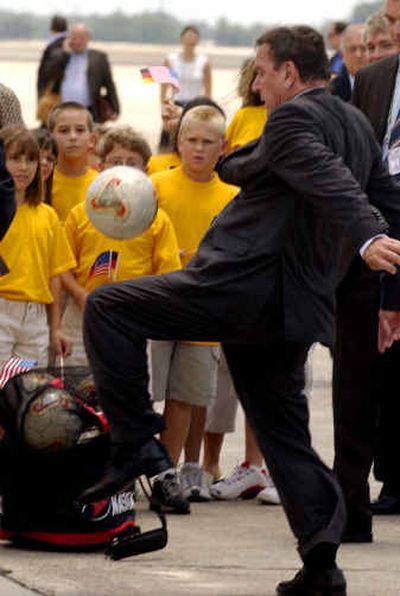Big-power summit opens on upbeat note

SEA ISLAND, Ga. — President Bush and other world leaders showcased a new harmony on Iraq on Tuesday as they met at their annual summit, but prickly issues remained over both Iraq and Bush’s plan to promote democracy across the wider Middle East.
Bush hailed the passage of a new U.N. Security Council resolution on Iraq as “a great victory for the Iraqi people” and thanked President Vladimir Putin for Russia’s help in winning the vote.
Putin, who had opposed the U.S.-led war in Iraq, called the U.N. vote “a major step forward” and said it would produce “a quality change in the status of Iraq.”
Despite the vote, Bush lowered expectations of gaining other countries’ military support in Iraq — one of the original hopes behind the resolution.
“I expect nations to contribute as they see fit,” Bush said as he met with Japanese Prime Minister Junichiro Koizumi on the opening day of the Group of Eight summit.
Of the powerful countries attending the summit on this secluded coastal resort island, only the United States, Britain, Italy and Japan have troops in Iraq. Japan’s noncombat troops perform humanitarian missions.
Germany, France, Canada and Russia do not have troops in Iraq and have said they will not send forces.
Summit participants seemed most in agreement on one particular issue: oil prices. They agreed they were too high. Putin denounced oil prices as “unreasonable” and German Chancellor Gehard Schroeder added that both western governments and OPEC have an interest in seeing them come down.
Schroeder did not elaborate on how it would be discussed or if any action could be expected.
A social dinner Tuesday evening marked the formal opening of the summit, but Bush first had one-on-one meetings with Koizumi and the leaders of Canada, Germany and Russia.
Throughout the day, heads of state arrived at an Army airfield near Savannah and were taken by helicopter to Sea Island, a five-mile long private resort island that has been virtually sealed off from the mainland by barricades and fences.
Police and journalists far outnumbered protesters, disappointing activists who said heavy security scared away many others. Protest marches in Brunswick, the nearest coastal city, and Savannah, 80 miles to the north, drew around 100 activists each on Tuesday.
The president also left the island in the late afternoon for an unscheduled visit to the summit’s Secret-Service-run command center on nearby St. Simons Island. Representatives from some 50 federal, state and local security and safety agencies were at the center.
The Security Council agreement on Iraq, approved by a 15-0 vote Tuesday, was an important victory for Bush, taking the sting out of recent disagreements with Europe.
British Prime Minister Tony Blair, Bush’s key ally in the war, called it “an important milestone.” And Schroeder, a leading opponent of the war, called it “a good foundation for enhancing stability.”
Bush and Schroeder in their private meeting talked about the possibility of a new role for NATO: training the Iraqi military. Bush floated the idea and Schroeder expressed some support, U.S. aides said.
But Bush’s proposal to promote democracy across the Muslim world has been seen by some as heavy-handed American interference.
Turkey’s prime minister told reporters the plan’s success depends on first resolving conflicts in Iraq and between Israel and the Palestinians.
“Solving the Israeli-Palestinian problem is an urgent matter above everything else,” Recep Tayyip Erdogan said in Ankara before leaving for the summit.